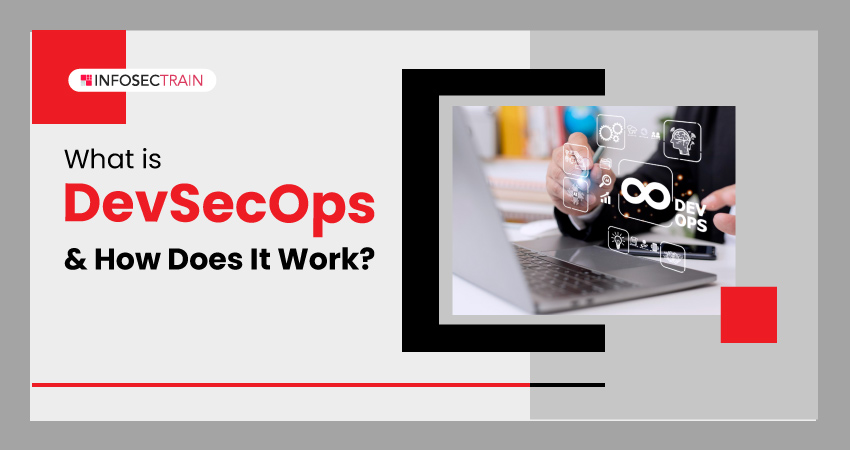What is DevSecOps and How Does It Work?
In the contemporary landscape of software development, DevOps has become a standard practice, with a significant number of organizations embracing its principles. However, within the DevOps universe, a new star is rising, known as DevSecOps. As per the Data Bridge Market Research report, the global DevSecOps market will surge from $2.59 billion in 2021 to a staggering $23.16 billion by 2029, with a remarkable growth rate of 31.5%. This surge underscores the critical role of security in software development and has garnered heightened interest among IT professionals globally.

Table of Contents
What is DevSecOps?
How Does DevSecOps Work?
DevOps vs. DevSecOps
Why is DevSecOps Important?
Who Needs DevSecOps?
What is DevSecOps?
DevSecOps, an acronym for Development, Security, and Operations, represents a paradigm shift in the way we approach software development. It represents a mindset, culture, and series of approaches that prioritize security as a fundamental component of the software development lifecycle.
DevSecOps recognizes that security should not be an isolated responsibility assigned to a specific team in the final stages of development. Traditionally, security was bolted onto applications after development, a practice no longer feasible in a world where development cycles have been compressed to weeks or days.
How Does DevSecOps Work?
DevSecOps tackles challenges by moving security to an earlier stage in the software development lifecycle. It means thinking about application and infrastructure security from the inception of a project. Instead of being a roadblock, security becomes an enabler, allowing for the swift and continuous delivery of secure applications.
A critical aspect of DevSecOps is automation. The DevOps pipeline is designed to automate repetitive tasks and streamline the development process. In the context of DevSecOps, this automation extends to security. Security gates and checks are automated to ensure the development workflow remains efficient and secure.
DevOps vs. DevSecOps
To fully comprehend the essence of DevSecOps, it is crucial to discern the difference between DevOps and DevSecOps. DevOps primarily centers on expediting software development and delivery, emphasizing cooperation between development and operations teams to enable swifter and more agile software releases. However, security is not always an integral part of the DevOps process, and it might be addressed as an afterthought.
DevSecOps, on the other hand, takes DevOps a step further. It augments the speed and agility of DevOps with a strong emphasis on security. It is about delivering applications that are as secure as they are rapid. DevSecOps ensures that security is considered at every stage of the software development process, from planning and design to coding, building, testing, and release.
Why is DevSecOps Important?
DevSecOps is crucial in a world where cyber threats are ever-evolving, and the cost of security breaches can be catastrophic. By integrating security from the beginning of the development process, DevSecOps reduces the likelihood of vulnerabilities going unnoticed until the production stage.
Organizations across various industries benefit from DevSecOps. In the automotive sector, it helps meet software compliance standards while reducing cycle times. Healthcare organizations can embark on digital transformation efforts while safeguarding patient data privacy. In the financial, retail, and e-commerce industries, DevSecOps addresses web application security risks and ensures compliance with data privacy standards.
Even in embedded systems, DevSecOps empowers developers to create secure code, minimizing serious software errors. The applicability of DevSecOps extends across diverse sectors, making it a valuable practice for anyone concerned about software security.
Who Needs DevSecOps?
Almost everyone is involved in software development. Whether you are a Developer, a Security Professional, a System Administrator, or an IT Manager, DevSecOps can benefit you. By learning the principles and practices of DevSecOps, you become better equipped to handle the challenges posed by the evolving security landscape.
DevSecOps with InfosecTrain
If you are looking to enhance and validate your DevSecOps skills, obtaining certifications in this field is a highly effective way to achieve recognition for your expertise. These certifications offer a structured way to learn and demonstrate your proficiency in DevSecOps practices. One such certification is the EC-Council’s Certified DevSecOps Engineer (E|CDE) certification. You can enroll in InfosecTrain’s E|CDE certification training course. This training course provides hands-on labs covering the entire DevSecOps pipeline, from planning to operations and monitoring.







 1800-843-7890 (India)
1800-843-7890 (India)